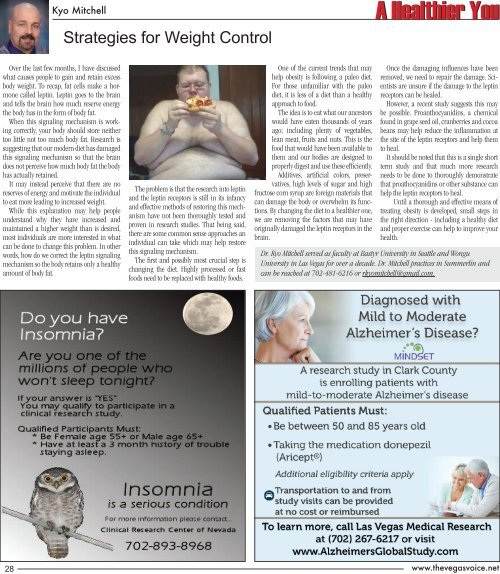You also want an ePaper? Increase the reach of your titles
YUMPU automatically turns print PDFs into web optimized ePapers that Google loves.
Kyo Mitchell<br />
Strategies for Weight Control<br />
A Healthier You<br />
Over the last few months, I have discussed<br />
what causes people to gain and retain excess<br />
body weight. To recap, fat cells make a hormone<br />
called leptin. Leptin goes to the brain<br />
and tells the brain how much reserve energy<br />
the body has in the form of body fat.<br />
When this signaling mechanism is working<br />
correctly, your body should store neither<br />
too little not too much body fat. Research is<br />
suggesting that our modern diet has damaged<br />
this signaling mechanism so that the brain<br />
does not perceive how much body fat the body<br />
has actually retained.<br />
It may instead perceive that there are no<br />
reserves of energy and motivate the individual<br />
to eat more leading to increased weight.<br />
While this explanation may help people<br />
understand why they have increased and<br />
maintained a higher weight than is desired,<br />
most individuals are more interested in what<br />
can be done to change this problem. In other<br />
words, how do we correct the leptin signaling<br />
mechanism so the body retains only a healthy<br />
amount of body fat.<br />
The problem is that the research into leptin<br />
and the leptin receptors is still in its infancy<br />
and effective methods of restoring this mechanism<br />
have not been thoroughly tested and<br />
proven in research studies. That being said,<br />
there are some common sense approaches an<br />
individual can take which may help restore<br />
this signaling mechanism.<br />
The first and possibly most crucial step is<br />
changing the diet. Highly processed or fast<br />
foods need to be replaced with healthy foods.<br />
One of the current trends that may<br />
help obesity is following a paleo diet.<br />
For those unfamiliar with the paleo<br />
diet, it is less of a diet than a healthy<br />
approach to food.<br />
The idea is to eat what our ancestors<br />
would have eaten thousands of years<br />
ago; including plenty of vegetables,<br />
lean meat, fruits and nuts. This is the<br />
food that would have been available to<br />
them and our bodies are designed to<br />
properly digest and use these efficiently.<br />
Additives, artificial colors, preservatives,<br />
high levels of sugar and high<br />
fructose corn syrup are foreign materials that<br />
can damage the body or overwhelm its functions.<br />
By changing the diet to a healthier one,<br />
we are removing the factors that may have<br />
originally damaged the leptin receptors in the<br />
brain.<br />
Once the damaging influences have been<br />
removed, we need to repair the damage. Scientists<br />
are unsure if the damage to the leptin<br />
receptors can be healed.<br />
However, a recent study suggests this may<br />
be possible. Proanthocyanidins, a chemical<br />
found in grape seed oil, cranberries and cocoa<br />
beans may help reduce the inflammation at<br />
the site of the leptin receptors and help them<br />
to heal.<br />
It should be noted that this is a single short<br />
term study and that much more research<br />
needs to be done to thoroughly demonstrate<br />
that proathocyanidins or other substance can<br />
help the leptin receptors to heal.<br />
Until a thorough and effective means of<br />
treating obesity is developed, small steps in<br />
the right direction - including a healthy diet<br />
and proper exercise can help to improve your<br />
health.<br />
Dr. Kyo Mitchell served as faculty at Bastyr University in Seattle and Wongu<br />
University in Las <strong>Vegas</strong> for over a decade. Dr. Mitchell practices in Summerlin and<br />
can be reached at 702-481-6216 or rkyomitchell@gmail.com.<br />
28 www.thevegasvoice.net

















